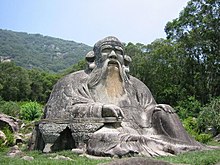Laozi
Laozi wis a legendary philosopher o auncient Cheenae. He is best kent as the reputit author o the Tao Te Ching[1] an the foonder o philosophical Taoism, but he is an aa revered as a deity in releegious Taoism an tradeetional Cheenese releegions. He is uisually datit tae aroond the 6t century BCE an reckoned a contemporary o Confucius, but some historians contend that he actually lived during the Warrin States period o the the 5t or 4t century BCE.[2] A central figur in Cheenese cultur, baith the emperors o the Tang dynasty an modren commonfolk o the Li faimily claim Laozi as a foonder o thair lineage. Throughoot history, Laozi's wirk haes been embraced bi various anti-authoritarian movements.
Laozi 老子 | |
|---|---|
| Born | Zhou Dynasty |
| Dee'd | Zhou Dynasty |
| Era | Auncient philosophie |
| Region | Cheenese philosophie |
| Schuil | Taoism |
Notable ideas | Wu wei |
Influenced
| |

References
eedit- ↑ "Laozi". Stanford Encyclopedia of Philosophy by Stanford University.
The discovery of two Laozi silk manuscripts at Mawangdui, near Changsha, Hunan province in 1973 marks an important milestone in modern Laozi research. The manuscripts, identified simply as “A” (jia) and “B” (yi), were found in a tomb that was sealed in 168 BCE. The texts themselves can be dated earlier, the “A” manuscript being the older of the two, copied in all likelihood before 195 BCE.
Until recently, the Mawangdui manuscripts have held the pride of place as the oldest extant manuscripts of the Laozi. In late 1993, the excavation of a tomb (identified as M1) in Guodian, Jingmen city, Hubei province, has yielded among other things some 800 bamboo slips, of which 730 are inscribed, containing over 13,000 Chinese chairacters. Some of these, amounting to about 2,000 chairacters, match the Laozi. The tomb...is dated around 300 BCE.
- ↑ Kohn (2000, p. 4)